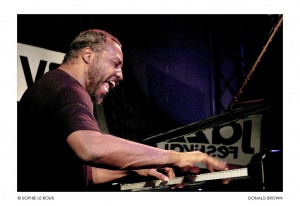Having spent a good few years on YouTube; the only place where, amongst other enthusiasts, musicians and so-called teachers get together to share their music and methods, I have come to see the general consensus of what it apparently takes to become a good jazz pianist: play fast, play blues scales, play/improvise linearly, waste time copying recorded material, etc, etc ad nauseum.
The above are indeed useful in their own little ways, but they come with a ceiling; a limit that you will never travel beyond because they are so far from what playing real jazz piano means.
 In this article, I would like to encourage you to stay away from the piano for a few days and reflect. By distancing yourself from your instrument, you will give your mind and heart time to find what they love, what they want to portray honestly, what their purpose is. What use is it to sit at the piano and play a bunch of chords and melodies with really lame improvisations based primarily on the blues scale or notes of the chord, and this without much rhythm or awareness of what you are playing and/or why? How would the listener feel? Have you ever thought about listeners? You are a listener, too, you know.
In this article, I would like to encourage you to stay away from the piano for a few days and reflect. By distancing yourself from your instrument, you will give your mind and heart time to find what they love, what they want to portray honestly, what their purpose is. What use is it to sit at the piano and play a bunch of chords and melodies with really lame improvisations based primarily on the blues scale or notes of the chord, and this without much rhythm or awareness of what you are playing and/or why? How would the listener feel? Have you ever thought about listeners? You are a listener, too, you know.
During your piano absence, listen to a lot of jazz music and try to acknowledge, consciously, what you enjoy the most. What kinds of chords and rhythms get your attention and touch you deeply? For example, I love Latin jazz chords (Bossa Nova) and I love swing trio jazz such as Oscar Peterson and Red Garland as well as lushious-chord-based gentle ballad jazz such as Bill Evans. Because I am aware of this, I know what I like to play when I sit at my piano and my music thus has a better structure and sound; it appears (because it is) more purposeful. Nothing sounds better than a Purposeful Pianist.
Once you have discovered what you like, focus your playing and practice on that style and what chord types and improvisational ideas come with it. You will be surprised at how your playing generally improves as a result.
Further to acknowledging what you enjoy and wish to portray, give thought to how one speaks their native language. A lot of things we learnt and developed subconsciously; a lot of things were learnt purposefully through study (specialised terms, for example). You never practiced to ‘speak fast', so why should you waste time trying to ‘play fast' as if it is something that can be practiced? The best jazz always involves purposeful playing, not showing-off playing, in the same way that the best language to listen to is clear, precise and to the point. Who cares if someone can speak fast; do they make sense when they do? Is it clear or do they mix words and stumble on strange letter combinations?
In conclusion, whilst what is available online (especially YT) is somewhat valuable to an absolute beginner, do your best to rise above the masses of pianists learning to play jazz and spend as much time reflecting about your playing as you do actually playing. You will be in a small, special minority and sound so much better.
Do you know blues scales in C, F and G? Great. Can you play C13, F9 and G13? Great. But do you have rhythm? Do you know how the A in C13 will sound in G13? It goes from being a 13th to a 9th and that is sweet; so play it for a purpose, don't just play linear scales; mix and match interesting number values against different chords.
Be purposeful in mind, be purposeful in playing.
Dan Bennet has published an inexpensive ebook called “A Philosophical Approach To Jazz Piano” for under $5 USD you can pick up this ebook today: Click Here for the ebook Be sure to tell him you found it on Music Learning Workshop. or get the Kindle version here.
Recommendations:
Great source for expanding your skills: Improvise for Real
